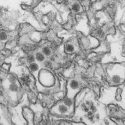Campus influenza cases on the rise
Since the beginning of February, there has been a marked increase in the number of students coming to University Health Services (UHS) at the University of Wisconsin–Madison with influenza-like illness and laboratory-confirmed influenza.
While the number of cases is still relatively small, "It’s fair to say that flu season on campus has begun," says UHS epidemiologist Craig Roberts. "We believe that cases will continue to rise."
In the week ending Feb. 1, 21 students came to UHS for influenza-like symptoms; in the week of Feb. 11-15, there were 40 such student visits.
"People tend to underestimate the impact of influenza on campus, because students generally make a full recovery," says Sarah Van Orman, director of clinical services. "But studies show flu hits students hard too, causing them to miss classes, have to make up assignments and lose time at work."
All students, faculty and staff are encouraged to help prevent the spread of flu to themselves, classmates, colleagues and family by washing their hands frequently throughout each day, using soap and water or alcohol-based gel; getting as much proper sleep, exercise and nutrition as possible; and covering all coughs and sneezes. The Centers for Disease Control and Prevention recommends coughing or sneezing into your elbow or bicep instead of into your palms, as hands are much more efficient than sleeves for spreading flu virus.
If you do develop flu symptoms, it’s best to stay home to the extent your schedule permits. Most people are infectious for about six days.
Influenza tends to come on suddenly compared with a cold; it often starts with fever, is characterized by extreme fatigue, and may be accompanied by body aches, headache, sore throat and/or a dry cough. Gastrointestinal distress is not typical with flu, though it is not unheard of. Symptomatic treatment involves plenty of bed rest, fluids and acetaminophen or ibuprofen for fever and body aches.
For frequently asked questions and additional information about influenza prevention, symptoms and treatment, visit the UHS Web site, and click on "Flu Season at UW: What to Do."
UHS has administered a record number of free influenza shots to students this season — more than 7,300 since October — and shots are still available by appointment; call (608) 265-5600. Although this year’s vaccine does not provide complete protection against some of the influenza types circulating this year, it can still protect enough to make illness milder and prevent flu-related complications.
Even people who have been immunized should follow the health precautions listed above.
"It’s really worth the effort to try to avoid getting the flu," says Roberts. "People who get it often say they haven’t felt that sick in years."



